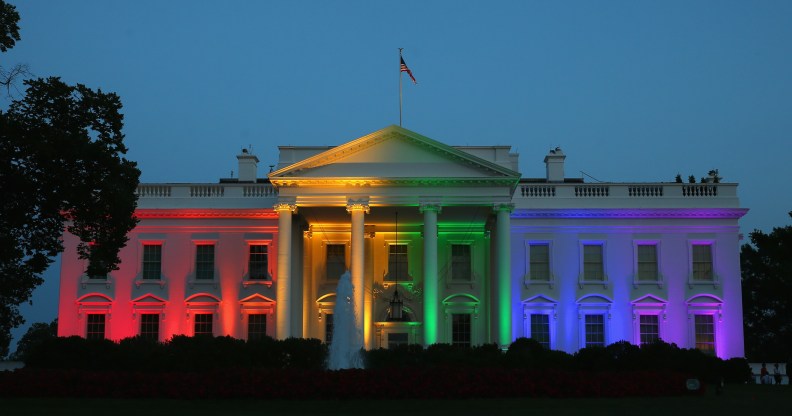Homophobia fell faster after same-sex marriage laws, research finds

US voters would prefer a gay candidate over one that’s more than 70 years old. (Mark Wilson/Getty)
New research has found that US states which legalised gay marriage before the 2015 Supreme Court ruling became more accepting of LGBT+ people at a quicker rate.
The study led by psychologist Eugene Ofosu found that “while anti-gay bias has been decreasing over time,” it did so “at roughly double” the speed after states introduced equal marriage.
“We find both implicit and explicit anti-gay bias was decreasing or stable over time before same-sex marriage legislation,” researchers wrote in the Proceedings of the National Academy of Sciences.
“However, following the passing of legislation perceived as supportive of this marginalised population, on average, anti-gay bias declined at a steeper rate.
“Following the passing of legislation, anti-gay bias declined at a steeper rate.”
—A study led by Eugene Ofosu
“Our work highlights how government legislation can inform individuals’ attitudes, even when these attitudes may be deeply entrenched and socially and politically volatile.”
States forced to adopt gay marriage experienced ‘backlash’
The exceptions to the trend were states which had resisted equal marriage, but were made to adopt it after the Supreme Court ruled that they must.
Equal marriage was a state issue until June 26, 2015, when the court ruling on Obergefell v. Hodges legalised it across the entire US.
States whose hands were forced experienced a “backlash”, apparently reflecting the “sense of symbolic threat” to their conservative values.
Ofosu and his team analysed approximately one million responses over a 12-year period to the Project Implicit website, which is designed to reveal a person’s unconscious bias.
They also looked at data from more than 10,000 participants in the American National Election Studies, which asked people to rate how warmly they felt about LGBT+ people.
The surveys were conducted “across all 50 states before, during, and after same-sex marriage legislation,” in 2008, 2012 and 2016.
Trump bans transgender troops
The research is especially poignant, coming as it does just days after Donald Trump introduced a ban on transgender people serving in the military.
The president has faced widespread criticism from LGBT+ campaigners and allies over the ban, which came into effect on April 13.
In March, a study found that there was a rise in hate crimes in counties which hosted Trump rallies in the run-up to his election in 2016.
The researchers noted that there was no concrete link between Trump’s rhetoric and the rise in crimes, but said that attempts to dismiss the figures as “faux hate crimes” were unrealistic.

